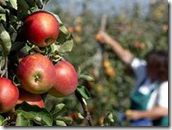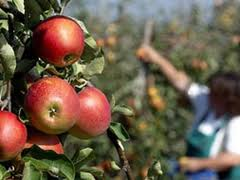 There can be few more passionate individuals than an Australian orchardist on the topic of fireblight, the destructive organism that can destroy a productive block of apple or pear trees almost overnight.
There can be few more passionate individuals than an Australian orchardist on the topic of fireblight, the destructive organism that can destroy a productive block of apple or pear trees almost overnight.
New Zealand has fireblight, and has been managing it for years. While a serious pest, it is largely a non-issue.
In Australia, where its presence on orchards has never been officially confirmed, it is the apple grower’s equivalent of the Black Death, with a long history of hysterical politics, whipped along by the small but vocal Victorian and New South Wales apple industries.
The suspicion has always been they fear competition more than fireblight. Accordingly, it took a ground-breaking complaint against Australia by New Zealand to the World Trade Organisation to overturn virtually the only protected market under the 32 year-old Closer Economic Relations agreement.
Now, the WTO decision has taken effect, with apples allowed into Australia from Wednesday of this week.
Yet just as this long-closed market in our closest, largest trading partner opens up, the New Zealand industry has fallen to in-fighting over whether an NZ Inc approach, using the light regulation available through the Horticultural Export Authority, is desirable, or whether to trust exporters to find value as they do every day in every other market where New Zealand apples are sold.
Had all gone according to industry lobbyist Pipfruit New Zealand’s plan, the Australian market would have been an developed right from the first season, using the HEA, a body that already regulates exports of such obscure items as squash and avocado.
Whether it’s done a good job of managing either is a matter of opinion. Those who support the HEA say it’s achieved better results than growers alone could have hoped for. Opponents say it’s bureaucratic waste of money.
However, the Cabinet was persuaded the idea made sense, approved inclusion of apples under the HEA late last month, and hatched a plan to whisk through the necessary legislation as a Supplementary Order Paper to a Statutes Amendment Bill currently before Parliament.
The HEA structure means only licenced exporters can send produce to the designated markets, product groups can adopt rules for exporting that are backed by the force of law and, most worrying to the growers who oppose it, can levy licenced growers to fund marketing campaigns.
But there was a snag.
The opposition of a single MP is all that’s needed to stop an S.O.P. going ahead. At the urging of a group of exporter-grower,s led by aspiring Act Party candidate and exporter John Thompson, Act’s parliamentary leader, John Boscawen, has blocked the HEA measure, meaning the earliest it can progress through
Parliament will be as separate legislation next year, way too late for the apples already sitting in packhouses awaiting shipment to Australia in the next few days.
With the Australian industry and politicians watching for a kiwi slip-up that could allow the apple ban to be reimposed, Pipfruit NZ’s chief executive Peter Beaven, fears the consequences of the last minute wrangling.
Both the New Zealand and Australian Governments are "very conscious of perceptions in this matter," says Beaven. "Political sensitivities will be lessened if there is order.
"I have to say I am quite frustrated by the position they’ve taken," he said of the opposing group of growers.
"What they have done makes no sense at all. We will still have a vote to see if it (the apple industry) wants the HEA. What Act’s movements will do is give the Australians ammunition."
John McCliskie, a former board member of the apple exporter ENZA, is furious about it.
"They are in danger of destroying the biggest opportunity for the industry in 50 years," he says, arguing that the vast majority of apple orchards are struggling to survive commercially, and that a united approach will be better than New Zealand exporters fighting one another to get into the two supermarket chains that control most of the fruit market in Australia.
Yet how important is this long-sought Eldorado of Apples? Twenty-two million Australians eat about half as many apples a year as we do, partly because they have a lot of other fruit, and the apple sector is small in that country.
The issues in Australia are far less important than gaining better market access to the Chinese apple market. At best, Australia might take 500,000 cartons a year, while the Chinese are already taking up to 800,000 and the total potential market there is in the millions of cartons annually.
Nor do Australian orchardists’ fears of competition seem well-founded. Australians like sweeter varieties than the ubiquitous kiwi Braeburn.
Growers associated with Thompson say the right apples for the Aussie market will self-select and are unlikely to be able to meet all demand. The HEA is simply a dead hand regulator without even the power to set prices, and is being foisted on the sector in a rush, they say.
In an email to David Carter on the issue, Yummy brand owner Paul Paynter said two large exporters had told him their support was "based around creating a cost structure that excludes small exporters – that is, it is a power play for them.
"Curiously the costs they hope to impose, with no doubt be allocated to grower pools, so in effect the growers will pay for their market power," said Paynter, who described consultation for HEA "wafer thin and inadequate to date"
Pipfruit NZ’s actions were "totally premature" prior to proper industry consultation.
The issue needs careful handling. When fireblight was discovered in the Melbourne Botanical Gardens in the mid-1990’s, the Australian response was on a par with an alien landing, and included officials in bulky bio-security hazard suits removing the offending plant under saturation media coverage.
When a visiting New Zealand plant scientist suggested the "outbreak" was evidence that Australia had already had fireblight for quite a while without ill-effects, Australian authorities accused the kiwi boffin of deliberately planting the fireblight to embarrass them.
Beaven says the HEA proposal, which falls well short of the kind of "single desk seller" arrangements used for kiwifruit and dairy exports, is proposed only for the Australia, because it’s a start-up market with particular sensitivities.
But to Paul Dellabarca, an exporter claiming to handle 12 per cent of total New Zealand apple exports, "HEA just adds costs and bureaucratic red tape that is unnecessary and brings no obvious or guaranteed benefits."
For the moment, the market liberals have won and so far there are only four local packhouses that can meet the stringent washing and testing requirements imposed by Australian border security.
However, Beaven expects as many as 12 may be registered by next season, and that by then, the industry will have a chance to consult fully about the HEA proposal.
What remains to be seen, however, is whether the horse has bolted in the meantime.
http://www.stuff.co.nz/business/farming/5475628/Apple-exporters-bicker-as-Australian-market-opens?

Deprecated: strpos(): Passing null to parameter #1 ($haystack) of type string is deprecated in /home/agriviek8Qv/agriviet.net/public_html/wp-includes/comment-template.php on line 2522